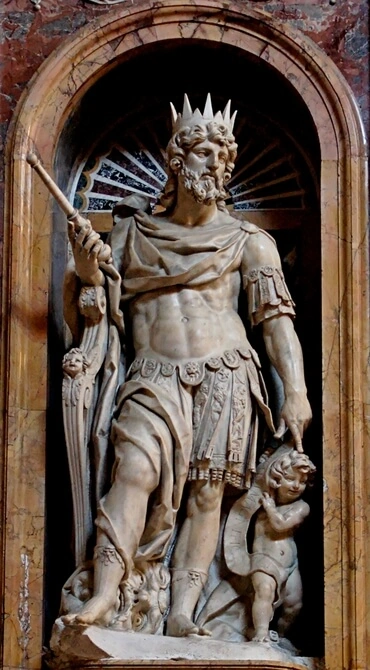1
过了一年,到列王出战的时候,大卫又差派约押,率领臣仆和以色列众人出战。他们就打败亚扪人,围攻拉巴。大卫仍住在耶路撒冷。
2
一日,太阳平西,大卫从床上起来,在王宫的平顶上游行,看见一个妇人沐浴,容貌甚美,
3
大卫就差人打听那妇人是谁。有人说:他是以连的女儿,赫人乌利亚的妻拔示巴。
4
大卫差人去,将妇人接来;那时他的月经才得洁净。他来了,大卫与他同房,他就回家去了。
6
大卫差人到约押那里,说:你打发赫人乌利亚到我这里来。约押就打发乌利亚去见大卫。
8
大卫对乌利亚说:你回家去,洗洗脚罢!乌利亚出了王宫,随後王送他一分食物。
10
有人告诉大卫说:乌利亚没有回家去。大卫就问乌利亚说:你从远路上来,为甚麽不回家去呢?
11
乌利亚对大卫说:约柜和以色列与犹大兵都住在棚里,我主约押和我主(或译:王)的仆人都在田野安营,我岂可回家吃喝、与妻子同寝呢?我敢在王面前起誓(原文是我指着王和王的性命起誓):我决不行这事!
12
大卫吩咐乌利亚说:你今日仍住在这里,明日我打发你去。於是乌利亚那日和次日住在耶路撒冷。
13
大卫召了乌利亚来,叫他在自己面前吃喝,使他喝醉。到了晚上,乌利亚出去与他主的仆人一同住宿,还没有回到家里去。
15
信内写着说:要派乌利亚前进,到阵势极险之处,你们便退後,使他被杀。
16
约押围城的时候,知道敌人那里有勇士,便将乌利亚派在那里。
17
城里的人出来和约押打仗;大卫的仆人中有几个被杀的,赫人乌利亚也死了。
19
又嘱咐使者说:你把争战的一切事对王说完了,
20
王若发怒,问你说:你们打仗为甚麽挨近城墙呢?岂不知敌人必从城上射箭麽?
21
从前打死耶路比设(就是耶路巴力,见士师记九章一节)儿子亚比米勒的是谁呢?岂不是一个妇人从城上抛下一块上磨石来,打在他身上,他就死在提备斯麽?你们为甚麽挨近城墙呢?你就说:王的仆人─赫人乌利亚也死了。
23
使者对大卫说:敌人强过我们,出到郊野与我们打仗,我们追杀他们,直到城门口。
25
王向使者说:你告诉约押说:不要因这事愁闷,刀剑或吞灭这人或吞灭那人,没有一定的;你只管竭力攻城,将城倾覆。可以用这话勉励约押。







